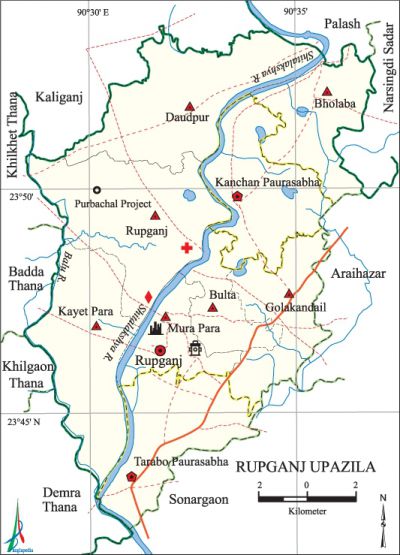Rupganj Upazila
Rupganj Upazila (narayanganj district) area 176.48 sq km, located in between 23°42' and 23°54' north latitudes and in between 90°28' and 90°37' east longitudes. It is bounded by kaliganj (gazipur) and palash upazilas on the north, sonargaon upazila on the south, araihazar and narsingdi sadar upazilas on the east, demra, khilgaon, badda and khilkhet thanas on the west.
Population Total 534868; male 279544, female 255324; Muslim 506423, Hindu 28179, Buddhist 40, Christian 164 and others 62.
Water bodies Main rivers: shitalakshya, Balu.
Administration Rupganj Thana was turned into an upazila in 1983.
| Upazila | ||||||||
| Municipality | Union | Mouza | Village | Population | Density (per sq km) | Literacy rate (%) | ||
| Urban | Rural | Urban | Rural | |||||
| 2 | 7 | 116 | 224 | 232356 | 302512 | 3031 | 49.8 (2001) | 53.1 |
| Kanchan Municipality | ||||||||
|
Area (sq km) |
Ward |
Mahalla |
Population |
Density (per sq km) |
Literacy rate (%) | |||
| 16.97 | 9 | 29 | 49468 | 2915 | 53.0 | |||
| Tarabo Municipality | ||||||||
|
Area (sq km) |
Ward |
Mahalla |
Population |
Density (per sq km) |
Literacy rate (%) | |||
| 19.39 | 9 | 21 | 150709 | 7773 | 56.3 | |||
| Upazila Town | ||||||||
|
Area (sq km) |
Mouza |
Population |
Density (per sq km) |
Literacy rate (%) | ||||
| 25.59 (2001) | 9 | 32179 | 2795 (2001) | 59.9 | ||||
| Union | ||||
| Name of union and GO code | Area (acre) | Population | Literacy rate (%) | |
| Male | Female | |||
| Kayet Para 55 | 6494 | 33580 | 32620 | 53.5 |
| Golakandail 39 | 4587 | 33470 | 29277 | 55.3 |
| Daudpur 31 | 6912 | 21901 | 20020 | 50.3 |
| Bulta 15 | 2381 | 26596 | 23380 | 56.2 |
| Bholaba 22 | 4259 | 16681 | 17327 | 49.8 |
| Mura Para 63 | 2184 | 16946 | 15647 | 59.8 |
| Rupganj 79 | 7222 | 24073 | 23173 | 51.2 |
Source Bangladesh Population Census 2001 and 2011, Bangladesh Bureau of Statistics.

Archaeological heritage and relics Bajra Mosque, residence of Mura Para Zamindar, Mura Para Shahi Mosque, At-ani Mosque and Tara Mosque at Gandharbapur, Brahmangaon Jami Mosque, Golakandail Kalim Shah Jami Mosque.
War of Liberation In 1971 the Pak army conducted mass killing and plundering; they also set many houses of the upazila on fire. On 21 November an encounter was held between the freedom fighters and the Pak army at Bholabo in which one freedom fighter was killed. The Rupasi Kanchan Road has been renamed as ‘Shahid Bakul Road’ in honor of his memory. Two memorial monuments have been built in the upazila.
For details: see রূপগঞ্জ উপজেলা, বাংলাদেশ মুক্তিযুদ্ধ জ্ঞানকোষ (Encyclopedia of Bangladesh War of Liberation), বাংলাদেশ এশিয়াটিক সোসাইটি, ঢাকা ২০২০, খণ্ড ৯।
Marks of the War of Liberation Memorial monument 2.
Religious institutions Mosque 290, temple 10, tomb 3. Noted religious institutions: Mura Para Shahi Mosque, Gandharbapur Ata-ani Mosque, Gandharbapur Tara Mosque, Brahmangaon Jami Mosque, Golakandail Kalim Shah Jami Mosque, Tomb and Mosque of Baba Saleh (1504).
Literacy rate and educational institutions Average literacy 54.8%; male 57.5%, female 51.9%. Educational institutions: college 3, secondary school 27, primary school 82, collegiate school 1, vocational school 2, kindergarten 3, madrasa 47. Noted educational institutions: Mura Para Degree College (1901), Mura Para Pilot High School (1901), Kanchan Bharat Chandra High School (1929).
Cultural organisations Library 4, club 12, cinema hall 4, women organisation 7, playground 7.
Main sources of income Agriculture 22.72%, non-agricultural labourer 3.14%, industry 9.19%, commerce 21%, transport and communication 6.58%, service 19.75%, construction 1.98%, religious service 0.18%, rent and remittance 3% and others 12.46%.
Ownership of agricultural land Landowner 44.07%, landless 55.93%; agricultural landowner: urban 46.97% and rural 43.44%.
Main crops Paddy, jute, wheat, sugarcane, mustard, vegetables.
Extinct or nearly extinct crops Kaun, barley, china.
Main fruits Mango, jackfruit, litchi, banana, papaya, blackberry, guava.
Fisheries, dairies and poultries Fishery 84, dairy 8, poultry 90.
Communication facilities Roads: pucca 176.58 km, semi-pucca 148.74 km, mud road 388.66 km; waterway 43.47 km.
Extinct or nearly extinct traditional transport Palanquin, bullock cart.
Noted manufactories Rice mill, flour mill, Jute mill, cotton mill, paper mill, hosiery industry, bakery, bidi factory.
Cottage industries Goldsmith, blacksmith, Muslin and Jamdani fabrics, weaving, brass and bell-metal work, wood work, embroidery.
Hats, bazars and fairs Hats and bazars are 42, fairs 5, most noted of which are Kanchan Hat, Golakandail Hat, Bholaba Hat, Mura Para Hat, Tarabo Hat, Kanchan Mela, Mura Para Dashami Mela, Golakandail Mela, Paschimgaon Baul Mela and Sabaspur Kali Mela.
Main exports Vegetables, hosiery goods, Muslin and Jamdani fabrics.
Access to electricity All the unions of the upazila are under rural electrification net-work. However 93.1% of the dwelling households have access to electricity.
Natural resources Natural gas has been detected at Kanta of this upazila.
Sources of drinking water Tube-well 94.7%, tap 1.8% and others 3.5%.
Sanitation 66.0% of dwelling households of the upazila use sanitary latrines and 31.9% of dwelling households use non-sanitary latrines; 2.1% of households do not have latrine facilities.
Health centres Hospital 2, family planning centre 9, health complex 1, clinic 2, diagnostic centre 3.
NGO activities Operationally important NGOs are brac, caritas, asa, CARE, PIDIM. [Khairul Alam Pulak]
References Bangladesh Population Census 2001 and 2011, Bangladesh Bureau of Statistics; Cultural survey report of Rupganj Upazila 2007.
